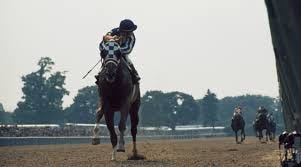The Compleate Barn Manager: Secretariat, The Super Horse.
The Thoroughbred Horse is intentionally bred to race. They are large horses with tremendous air capacity and muscles to run. They have agreeable personalities and are gentle by nature. OTTB's are popular leisure horses and are easy to work with and care for.
There are many Triple Crown winners, but one stands out in modern times as the Super Horse.
Secretariat was capable of leading from the gate and winning by lengths.
What was the secret to his success? Secretariat's heart was twice the size of the usual Thoroughbred. He could pump oxygenated blood through his system at twice the rate of any other horse. I was an endurance athlete for 40 years, I did 14 marathons, (including the 1991 Boston Marathon), 12 triathlons (one Iron man) and numerous shorter races Although both parents died from heart attacks (Father a six packs a day smoker and alcoholic) Mother heart defect and smoker). I never smoked, drank or used drugs. I did gain weight after high school (did sports: baseball, basketball, cross country. After my father died from multiple heart attacks, my doctor began to treat me with blood pressure medication. I had bad reactions to this and decided to start running at 240 lbs. Along with this I went on 3 day fasts and lost 100 lbs. This changed my metabolism and I went from a 44 inch waist to 28 and from getting sunburned to a tanner. Later, after arthritis came on from too much mileage, I had switched to horseback riding and used my legs to control my horse's movements. They say you can't control your genetic inheritance. I did. At 78 I am still partly arthritic but still active.
This is not a dictum for all species.
Secretariat had a huge heart. He could pump oxygenated blood through his system that energized him beyond his competitors. But this had a hidden problem. Not all his foals accommodated this advantage. I cared for a Secretariat progeny who could not physically accommodate the huge heart he inherited. “Dozer” (he was huge). developed congenital heart disease. I found him one day lying down in his outdoor stall. As a barn manager I did regular inspections of all the horses’ pens and pastures. Unusual behavior was noted and reported. Colic symptoms were acted upon immediately. Haltering and walking to prevent rolling was done until the owner or vet showed up. This is how I spent my 18 hour days, 7 days a week. Dozer's behavior got me moving. There were no signs of colic-distress and his owner got him vet-checked. Besides the diagnosis of heart disease, he had cancer. The heart-breaking decision to euthanize was made and he had a dignified and merciful ending thanks to his kind-hearted owner.
Know your horse’s genetic inheritance and keep watch. Some issues can be prevented, but foreknowledge is a valuable tool in prevention. I lost a filly who was a nervous wreck. She was claustrophobic and could not tolerate an indoor stall. Eventually, she colic'ed in snow storm and had to be euthanized I still mourn her loss.




my latest Barn Manager article.